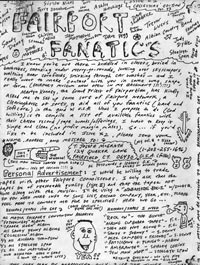Fairport Fanatics, a newsletter for fans of British folk-rock band Fairport Convention, was started by TJ McGrath in 1983. Music lovers who bought Fairport albums noted an announcement on the back of album covers directing them to send a few dollars to McGrath’s Connecticut address, and a print community was born. Kindred spirits began to write to and for one another, directing each other to yet more bands in a similar vein, historical references behind the songs, new musical directions taken by former FC band members…. this is a dinosaur version of Internet newsgroups and web communities.
Paul Hartman of Baltimore, Maryland, a computer software developer by trade and music fan by avocation, was one of the first on his block to purchase a home computer in the early 1980s. He put it to immediate use as an assistant to McGrath, typing articles and assembling pages in a coherent way. (Heretofore the many submissions from various authors had been assembled piecemeal and pasted up for photocopying.) Around 1987, when McGrath returned to graduate school and found more demands on his time, Hartman took over the production of Fairport Fanatics.
Under Hartman’s tenure, the newsletter became a more polished print publication, and eventually a glossy magazine available in independent bookstores and chains such as Barnes and Noble, Borders, and Chapters (in Canada) as well as having subscribers all around the world. Many of the earliest writers from Fairport Fanatics days continued to write articles and reviews for the magazine, renamed Dirty Linen in homage to its Fairport Convention roots (“Dirty Linen” is a set of traditional Irish fiddle tunes that was updated into a folk-rock medley on Fairport’s Full House album in 1970), and other writers came onboard as the magazine grew in size, musical breadth, and commercial stature. Covering a broad spectrum of roots music traditions and innovations, Dirty Linen ran articles on everything from American singer/songwriters to Celtic rock bands to interpreters of traditional African, Mexican, or Celtic materials to string bands, jug bands, slack-key guitarists, and more.
And there were always the reviews. The central office of Dirty Linen often received more than 75 CDs a week, and the Hartmans (by the mid-90s, Dirty Linen had turned into a family business with Paul and his wife, Susan, at the helm) listened to every CD that came through to evaluate it for review. In a music-business version of equal opportunity, independent labels were well represented in DL’s review pages, which regularly featured in excess of 250 recording, video/DVD, concert, and book reviews… a treasure trove of information for the roots music aficionado. More


